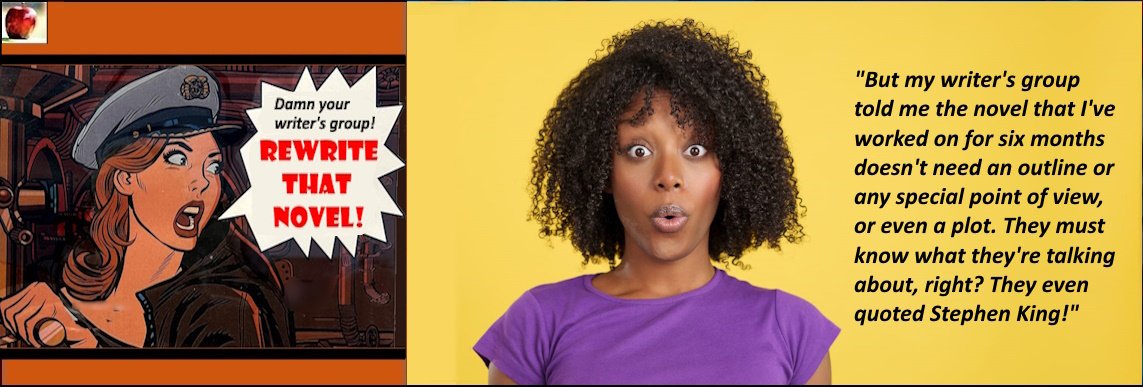Art and Life in Novel Writing
 Misc pearls of utility plus takeaways on craft learned from books utilized in the AAC novel writing program including "Write Away" by Elizabeth George, "The Art of Fiction" by John Gardner, "Writing the Breakout Novel" by Donald Maass, and "The Writing Life" by Annie Dillard:
Misc pearls of utility plus takeaways on craft learned from books utilized in the AAC novel writing program including "Write Away" by Elizabeth George, "The Art of Fiction" by John Gardner, "Writing the Breakout Novel" by Donald Maass, and "The Writing Life" by Annie Dillard:
 The Perfect Query Letter
The Perfect Query Letter
 The Pub Board - Your Worst Enemy?
The Pub Board - Your Worst Enemy?
 Eight Best Prep Steps Prior to Agent Query
Eight Best Prep Steps Prior to Agent Query
99 topics in this forum
-
- 1 reply
- 1k views
You begin your first novel with equal parts ignorance and false optimism. Many months, or even years later, you finally learn the enormity of your mistakes. Those popular writer magazines and the sociable little group of amateur writers that looked like a great plan, at first, now appear unreliable and even time wasting. At this juncture, you will either deny reality, quit altogether, or else vow to become a true and humble apprentice to the art of novel writing. Ne confondez jamais une seule défaite avec une défaite finale. - F. Scott The process above is nearly inevitable for the vast majority of aspiri…
 Last reply by EditorAdmin,
Last reply by EditorAdmin, -
- 1 reply
- 1.4k views
Brilliant portrayal of the classic, ignorant narcissist who one day decides he'll soon write a bestseller despite the obvious fact he knows little or nothing about developing and writing a novel. ________________________________
 Last reply by EditorAdmin,
Last reply by EditorAdmin, -
- 1 reply
- 2.2k views
A subject that often goes by the wayside until too late. People say, I write for myself, and it sounds so awful and so narcissistic, but in a sense if you know how to read your own work—that is, with the necessary critical distance—it makes you a better writer and editor. When I teach creative writing, I always speak about how you have to learn how to read your work; I don’t mean enjoy it because you wrote it. I mean, go away from it, and read it as though it is the first time you’ve ever seen it. - Elissa Schappell ____________ Twenty years, several novels, a room full of edited manuscripts, and hundreds of workshops late…
 Last reply by EditorAdmin,
Last reply by EditorAdmin, -
- 1 reply
- 534 views
Note this does not include a long story pitch or short synopsis (which will sink you if you don't know how to artfully write it), but rather a single hook line (which will also sink you for the same reason). Note that comparables (at least two) are vital to your novel. Dear Mr. or Ms. (name of agent): ( Open by noting you saw a relevant deal they concluded on PM. It marks you as a true professional. ) I noted in Publishers Marketplace that you represented XYZ Title to ABC Publisher, and I am querying because I have recently completed a novel that might work for your list. You may recall that we met at the XYZ conference [if this is relevant] and thank y…
 Last reply by EditorAdmin,
Last reply by EditorAdmin, -
- 3 replies
- 1.9k views
How to prepare before sending queries to agents, e.g., utilize Publisher's Marketplace to intelligently narrow down the best possible candidates. Algonkian Writer Conferences reviews each step in turn. Here is our take on the smartest way to go about it. As a bonus, you learn a lot of insider knowledge about the business (like who is in "the club" and who is not--see below) along the way. You might also come to the realization that your ms is not yet ready. Such illumination is always a positive thing. Join Publisher's Marketplace and review it for at least a month (yes it costs a few bucks, but so what?). Search out the deals …
 Last reply by Admin_99,
Last reply by Admin_99, -
- 1 reply
- 457 views
Are "brutal" reviewers really good for you? So what spurred this question? A friend recently said she had a "brutal critique partner" that could be relied on. It got me to thinking about brutal reviewers in my own experience who were worse than useless and actually destructive. We need to keep in mind that the better an ms becomes, the harder such "brutal" critics are forced to dig for critique at all costs, inevitably focusing on matters of taste, e.g, "I don't like that character's personality..." as opposed to "I think this point could be made clearer by doing XYZ." You could put 10 of these brutal negative types in a room and they would shred an unpublished no…
 Last reply by Admin_99,
Last reply by Admin_99, -
- 0 replies
- 332 views
By Richard Curtis If you do something so horrendous as to provoke your agent to declare, "Life is too short," you'd better start looking for someone else to handle your work. It means you have tried his or her patience beyond its limit. You're a walking dead author. We recently described good timing as one of the most important virtues a literary agent can bring to the job. There's another that most good agents possess, and that's patience. If timing is the art of "when to," patience is the art of "when not to." Unfortunately, that often means when not to knock my head against a wall, wring an author's throat, or hop in a taxi, race over to a publisher's office…
 Last reply by EditorAdmin,
Last reply by EditorAdmin, -
- 1 reply
- 696 views
Several times a year I'll receive an email from a memoir writer wanting to know if attending one of our writer events is worth it. The answer is always a mixed bag depending on several factors; however, for purposes of meaningful sample, I've decided to include a recent response to a concerned memoir writer who inquired about the potential of the Write to Pitch Conference to support her ambitions and assist in promoting her life story. Dear Madeline, You appear to desire real honesty, so I'll take a chance and provide you with that. As you read what I have to say, keep in mind that I respect memoir writers for having the courage to tell their stories I quite underst…
 Last reply by EditorAdmin,
Last reply by EditorAdmin, -
- 2 replies
- 586 views
Authorial Misdemeanors - Agent Richard Curtis There seems to be a law of nature that the quality of a manuscript declines in inverse proportion to the elaborateness of its package. When I receive a manuscript bound by brass screws with a plastic embossed cover, lovingly wrapped in chamois cloth, set in a velvet-lined cedar box, shrink-wrapped, packed in turn in a fireproof strongbox secured with iron bands, I am prepared to stake my career on the likelihood that this book is one colossal dud. From time to time an author will do something that causes me to scratch my head. I've compiled a list of these foibles and offer it here with a…
 Last reply by EditorAdmin,
Last reply by EditorAdmin, -
- 2 replies
- 1.7k views
Have you ever been in writer workshops and reacted to criticism of your writing or story by demanding the other writer defend their decision in such detail that it served your purpose of making certain they never gave you unfavorable critique again? Hell hath no fury like a thin-skinned narcissist with a needy manuscript... But wait! Could you be one of them? In case you're not sure if your skin qualifies, Algonkian psychologists have developed a few skin test questions below. Feel free to respond honestly to yourself as you read each one. Everyone wishes to avoid time-wasting instances of Offended Writer Syndrome (OWS) that often takes place in writer wor…
 Last reply by Admin_99,
Last reply by Admin_99, -
- 1 reply
- 631 views
So your agent has finally found a sympathetic editor for your wondrously impatient manuscript? And they work at a major publishing house, imprint, or press. Now you think you're in tight? Whooo! Think again. The obstacle course has just begun. Your credentials and manuscript are facing the gauntlet of THE PUB BOARD! The what? A group of chair-bound editors and professional types at the press who down or up their thumbs for the stack of proposals sitting in front of them; and it varies from place to place, but more often than not, the pub board meets once a month. They include the specific editor who is a fan of your manuscript, of course, but what about …
 Last reply by Admin_99,
Last reply by Admin_99, -
- 0 replies
- 497 views
Very Important Questions to Ask Yourself So you're searching high and low for a decent and experienced freelancer to read your novel ms and provide it with the healing touch it needs. You most likely will require thorough developmental editing, not to mention narrative or sample line edits at a minimum. Okay. So where to go? There are Google pages full of poor editorial services out there and just about anyone can claim to be a novel editor. Therefore, how to winnow forth the quality expertise you must have? Below are a few questions to ask yourself before engaging any editorial service: Do you get to review the credentials of the precise person who w…
 Last reply by Admin_99,
Last reply by Admin_99, -
- 0 replies
- 414 views
Since you asked... Nearly everyone has the potential to write a breakout novel and go on to become a successful commercial author, but precious few finally accomplish the task. Do we know why this is the rule? Writer conferences, author workshops, books, ms editors, and even the most pointless of MFA programs play a part in a writer's evolution, but none of these provide the overall pragmatic means and method to finish the job (and quite often, not even to start it). If this were not the case, an imaginative and ambitious writer would only have to attend an MFA program at Iowa, for example, and become a published author in due course. But this rarely if ever hap…
 Last reply by Admin_99,
Last reply by Admin_99, -
- 0 replies
- 359 views
These bullets of advice for writers in all genres were taken from a review of the SFF author Brandon Sanderson on the video forum and they're worth repeating here for emphasis: The concept of "borrowing" or getting story ideas, entire structure, or themes from other books or films can't hurt and might actually lead to publication; but I maintain you step carefully. The concept may already be overdone, a stale trope. His advised method of transposing the "structure" of one type of genre novel onto another can be productive--reminiscent of Italian writers in the old days transposing Japanese samurai scripts into spaghetti westerns. Another good example is the …
 Last reply by Admin_99,
Last reply by Admin_99, -
- 0 replies
- 470 views
By Chris Stewart As someone who organizes readings and a large literary arts festival with workshops, author appearances, and exhibitors, I have developed a list of writers who I will not work with again. And rest assured, I’m not the only one who does this. Why? Because they didn’t follow directions. It’s that simple. Who's on it? Writers who acted like the organizer/staff were their personal assistant/manager. Take note of the following ways to avoid this blacklist and be a true professional! KNOW YOUR OWN SCHEDULE Double booking is such a big no-no we can’t believe you’re not aware of this already yourself. Whatever you have to do to make sure you …
 Last reply by Admin_99,
Last reply by Admin_99, -
- 1 reply
- 578 views
 Last reply by EditorAdmin,
Last reply by EditorAdmin, -
- 0 replies
- 429 views
Barbara Zitwer specializes in discovering new writers from all over the world. They look for writers with original voices and who have commercial, international appeal, and also for books that have potential to be developed for film and television. Barbara Zitwer herself specializes in developing books and editing. She has written several books as well as the play, PAPER DOLL, about Jaqueline Susann, produced in regional theaters throughout the US. She has produced landmark films such as VAMPIRE'S KISS with Nicolas Cage, was Executive Producer on LAZARUS RISING with Columbia Tri-Star and Bernie Sofronski, and she executive produced THE FRIDAY NIGHT KNITTING CLUB with Juli…
 Last reply by Admin_99,
Last reply by Admin_99, -
- 0 replies
- 576 views
New York Pitch Book Reports "The Art of Fiction" by John Gardner (a great primer for this commercial program) How did the book help you as a writer? What overall aspects of it taught you something“ The Art of Fiction” helped me as a writer by introducing me to the concept of fiction as a vivid dream and presenting many tools to create that dream for the reader. The book also talks about the important of sentence structure down to word choice and explains the use of scansion as a tool to create the vivid dream. What two or three major lessons did you learn from the book that you can apply to your writing a…
 Last reply by LauraLou,
Last reply by LauraLou, -
- 0 replies
- 829 views
An absorbing conversation about "sensitivity reading" and the extreme absurdities resulting from the SR rationale.
 Last reply by Admin_99,
Last reply by Admin_99, -
- 2 replies
- 1.5k views
BOOK REPORTS "The Art of Fiction" by John Gardner 1. How did the book help you as a writer? What overall aspects of it taught you something? It reinforced for me some vital components that must permeate the book throughout. For example, the story development must continuously cast forwards, drawing the reader from paragraph to paragraph, from scene to scene. Any let up and the reader can stop caring where the story will go next, at which point the writer has failed, and the reader stops reading. This was particularly important for me to get in my head in the early scenes when I move from place to place, character to character. I had initially focuse…
 Last reply by EditorAdmin,
Last reply by EditorAdmin, -
- 1 reply
- 3.2k views
I suspect that most writers have “Get Published” on their list of goals for the year. Given that this assumption is correct (and I’m pretty sure it is), I’m dedicating this week’s post and next week’s to getting published and what to expect in the process. Whether you’re looking into the traditional route or self-publishing, I’ve got something for everyone. Without further ado, here are my top five picks for this week: #1: Podcast 365. Sunrise, Sunset, and Behind the Scenes in Publishing: Hanging out with Abby Zidle Abby Zidle is the senior editor and associate director of marketing at Gallery Books. While this podcast is mostly geared toward the romance genre, …
 Last reply by Kathy LaFollett,
Last reply by Kathy LaFollett, -
- 0 replies
- 1.1k views
Writing Hacks. Are they helpful or hurtful? I, for one, have never cared for the word hack in this instance because it makes it sound like you are potentially BS-ing your way through your writing goals, thus leaving your integrity at the door. I’ve also never really understood the entire “hacking” trend because in so many instances they are just using the word hack in place of the words tip or advice. However, with all that being said, we’ll say that hacking is a good thing for our purposes today because it helped me find some new techniques for novel writing that I couldn’t have found any other way. So, here are my top five writing “hacks” for the week (the titles are pr…
Last reply by KaraBosshardt, -
- 0 replies
- 983 views
My very first manuscript was horribly cliché and pretty much plotless. In fact, it didn’t even have an ending to it. I never bothered writing one. It was clear to me that by 80,000 words there was no point in wasting my time on devising a resolution because there was never even a climax. It literally turned into one very lengthy exercise in getting to know my main characters—because I hadn’t bothered doing that before I started to write my novel. And this was okay at the time. I was brand new to creative writing and I just wanted to test my hand at being a writer since I’d never done anything like it before, unless you count the horrible required writing assignments in En…
Last reply by KaraBosshardt, -
- 0 replies
- 1.1k views
When it comes to my all-time favorite fictional character it will always and forever be Andrew Wiggins, better known as Ender. I have loved fictional stories ever since I could read. I especially love fantasy and sci-fi. However, I had never really connected with a main character very deeply in a novel until I read Ender’s Game, by Orson Scott Card, when I was in the latter part of Junior High school. I have since read that story multiple times and my 14-year-old self connects just as deeply every time. Every author’s dream, right, to have their stories cherished for decades? But why did I completely fall in love with this particular character? I was a teenage girl w…
Last reply by KaraBosshardt, -
- 0 replies
- 880 views
Truthful, authentic, honest. All these words mean roughly the same thing, but in this case, I’ve chosen these words to describe writers and the stories they create. I’m sure you’ve all heard phrases such as “find your own authentic voice,” or “write your truth,” or “be true to your craft.” Or even “be honest with your readers.” I realize that these phrases are ambiguous at best and are usually tossed around at writing conferences to make a speaker sound like they know what they are talking about. So…what am I getting at? To be honest in what you are writing, or to be truthful in the story that you create means showing a side of yourself that you may not want to. To b…
Last reply by KaraBosshardt,









